英语必修四unit4课件
高中英语人教版必修四unit4body_language重点单词和短语ppt课件

通知;通告;布告
Ⅱ.重点短语必背
1.__d__ef_e_n_d__a_g_a_in_s_t *2.__o_n_t_h_e_c_o_n_t_r_a_r_y__ *3.__a_t _e_a_se_ *4.t_u_r_n__o_n_e_'s_b__a_ck__t_o_
5.__g_e_t__cl_o_s_e_t_o *6._b__e_l_ik_e_l_y_t_o_._..__ *7.__i_n_g_e_n_e_r_a_l *8.__lo_s_e_f_a_c_e_ 9.__w_a_t_c_h_/_lo_o_k__o_u_t_ 10. put up
n. 真实;
真理
14. truly adj.好奇的→ trnu.th好奇心
adv. 好奇地→
true
15. curiovuts. 保护;保卫→
cunr.iou防sl御y ;保卫
curiosity
defend
defence
1.语境串记(用所给词的适当形式填空) (1)It was curiousthat he should have given in to _______ and openceudritohseity
2.主题串记
请根据词性和汉语提示写出以-ment为后缀的高频单词
(1) statement n.
陈述;说明
(2) achievementn.
功绩;成就
(3) adjustment n.
调整;调节
(4) advertisement n.
广告
(5) agreement n.
同意;一致;协定;协议
(6) announcementn.
代表;象征 接近;靠近;走近 接近;方法;途径 主要的 成人;成年人 成人的;成熟的 可能的
人教版高中英语必修四 Unit4 Body Language reading 课件

Para1 Body language is one of the most powerful means of communication, often even more powerful than spoken language. People around the world show all kinds of feelings, wishes and attitudes that they might never speak aloud. It is possible to "read" others around us, even if they do not intend for us to catch their unspoken communication. Of course, body language can be misread, but many gestures and actions are universal.
but many gestures and actions are universal. Para7 With so many cultural differences between people, it is great
to have some similarities in body language. We can often be wrong about each other, so it is an amazing thing that we understand each other as well as we do!
Para7 With so many cultural differences between people, it is great to have some similarities in body language. We can often be wrong about each other, so it is an amazing thing that we understand each other as well as we do!
人教版高中英语选择性必修第四册unit4复习课件

指出下列句子中画线部分所作的成分。
1. This is a subject worthy of careful study. 作 __定__语_____ 2. Our English teacher is very nice and patient. 作 _表__语_____
3. I found it very hard to get along with foreigners. 作宾__语__补__足__语_
4.ripe adj.成熟的;时机成熟的 →ripen vt.& vi.(使)成熟 5.disabled adj.有残疾的;丧失能力的 →disability n.缺陷;障碍 →disable vt.使(某人)残废;使……无能 6.deserve vt.值得;应得;应受 →deserving adj.值得的;应得的
读后续写之手的肢体动作:drag/draw/pull拉;cup one’s hands over... 把手窝成杯状;slide one’s hands into...将手伸进……;put one’s hands to one’s cheeks用双手捂住脸;spread one’s hands摊开双手
3 deserve vi.& vt.应受;应得;值得(deserving adj.值得的;应得的)
deserve sth. 值得/应得某事/物 deserve doing/to be done值得被……(此处用动名词的主动形式表示被动 意义,类似用法的动词还有:need,want,require等) deserve it(口语)活该;自作自受
合作探究1
指出下列句子中画线名词短语所作的句子成分,并注意其组成。 1. These ideas may seem strange to you. 作 __主__语__ 2. We love our great motherland very much. 作 __宾__语__ 3. The man wearing a black coat is our teacher. 作__表__语_
高中英语必修四Unit4《Bodylanguage》教学课件
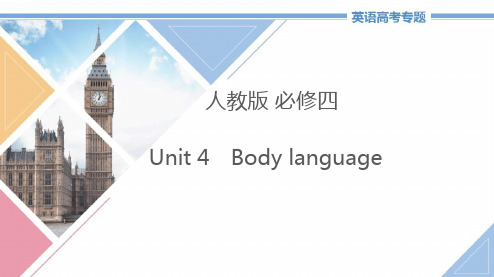
考点分层突破
·即学即练 (1)单句语法填空 ①To show this,she held up one chopstick, representing (represent) one person. ②She represents her mother as the kindest mother in the world.
基础自主梳理
【记一记】——词不离群
1. “in+n.”短语一览
①in general 总的来说;通常 ②in addition 另外,加之 ③in advance 预先, 事先 ④in brief 简单地说 ⑤in common 共用的,共有的 ⑥in debt 欠债 ⑦in difficulty 处境困难 ⑧in hand 在进行中,待办理 ⑨in person 亲自,本人 in time 及时 2.face短语盘点 ①save one's face 挽回面子 ②make a face 做个鬼脸 ③face to face 面对 面 ④in the face of 面对 ⑤be faced with 面对
基础自主梳理
【句式再现】攻克句型 对接高考
背句型(课本这样讲)
记公式(公式这样记)
仿句子(高考这样考)
1._T__h_e__f_i_r_s_t_p__e_r_s_o__n__t_o__a_r_r_iv__e_
was Tony Garcia from
Colombia, closely followed by Julia Smith from Britain.
基础自主梳理
【记一记】——词不离群 1.否定前缀mis①mislead误导 ②misjudge误判 ③mistrust不信任;怀疑 ④mishandle处 理不当 ⑤misunderstand 误解 2. “主要的;重要的”形容词家族 ①major 主要的,重要的 ②main 主要的 ③chief 首要的 ④primary 主要 的,首要的 ⑤important 重要的,重大的 ⑥leading 重要的,首位的 ⑦principle 主要的,首要的
新课标人教版高中英语必修四 Unit 4 Body language-communication no problemReading课件

puzzling/confused amazing/surpried
crazy/very sad/unhappy
What do these faces mean?
grievous/sad complaint
happy/shy
What do these faces mean?
amusing/happy laugh at
(para. 5)
students
• Careful reading para1
• Judge the following sentences T or F
• 1. Yesterday, another student and I, representing our university's student association, went to the Capital International Airport to meet this year's international students. T
__g_e_s_tu_r_e_s_, and__p_o_s_t_u_r_e_s_,
or the
ways you stand, are different kinds of body
language.
Let's play game !
• guess
what is he/she doing ?
Some body languages are different in different countries.
1. Is the author of this passage a man or a woman? How do you know?
A man Ahmed Aziz did not shake hands with women, but he shook with the author.
Unit4Languagepoint课件人教版高中英语选择性必修第四册

【应用实践】 ①Hearing the news, she was dying __B_______ her husband on passing the driving test. A. for concentrating B. to concentrate C. to be concentrated D. to concentrating ② The staff are dying _f_o_r___ a chance to go to the shore annually. ③ The child can’t wait to return to school because he is thirsty _fo_r_ knowledge.
6.to be honest
____说__实___在__的________
7.make a difference to ____对__._.__._有__重___大__影__响
8.participate in 9.upside down
____参__加_____________ ___上___下__颠__倒_________
(different).
3. be relevant to
(1) Sometimes I wonder how relevant chemistry is to these students — few will ever become chemists—and most will be going back to their villages after Year 8 anyway. 有时 候,我真想知道,化学对这些学生究竟有多大用处,很少有人会成为化学家,并且他们 中的大多数人学完八年级以后就要回到他们的村庄去了。 (2) I don’t think what he said is related to the topic we are discussing. He has missed the point.我觉得他说的和我们正在讨论的话题不相关。他已经跑题了。 (3) The film has relevance to what is being discussed in class.这部电影与课堂上正在讨论 的事情有关。
人教版高中英语必修四Unit4 Body Language 词汇课件

[搭配] @greet sb. with 以...(方式)向某人打招呼/欢迎某人 [例句] • He greeted all the guests _w__a__r_m__ly___(warm) as they approached him . • She greeted us _w__it_h____her charming smile . • They exhanged greetings and __s_a_t___(sit) down to lunch.
[搭配] @be curious about...对...感到好奇;be curious to do sth极想做某事 @It is/was curious that ...真奇怪...
[例句] • Suddenly the girl calmed down and _c_u__r_io__u_s_l_y_____(curious) began
[同根词] representation n.(U)描绘;表现 representative adj. 典型的;有代表性的; n.代表性人物
[搭配] @associate...with...把...和...联系起来;be associated with 与...有关系 @have assoication with ...与...有联系;in association with...与...联合
高中英语 Book4 Unit4body language 说课课件 新人教必修4(通用)
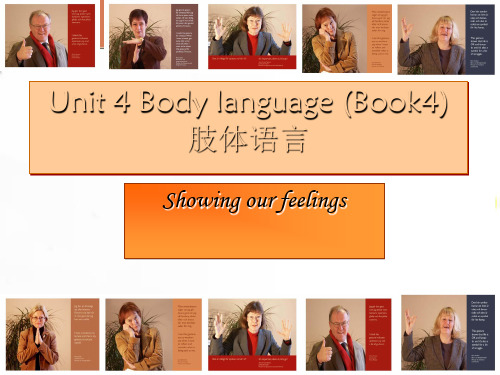
1). Analysis of the teaching material 教材分析
The type of this class is an extensive reading class, which plays an important part in developing students’ reading ability. So,during the teaching process, the teacher should focus on developing the students’s reading ability by extensive reading, and get them to learn some reading skills such as skimming, scanning and so on. Moreover, the students should receive some moral education, let them know more about body language in cultures in different countries.
课前探索(Pre-class Exploration):
Let students search for more information about body language which shows different meanings in different cultures and countries.
掌握该部分的重点词句
3.Let students read and understand the passage “Showing our feelings”.
让学生读懂本篇文章
Teaching difficult points (教学难点)
高中英语Unit4 课件外研版选择性必修第四册

这种咖啡的特点是:品质上乘,混合均匀,味道温和。
[例 1] He is superior to the other man. 他比另一个男子级别高。 [例 2] That army won because of superior numbers. 那支军队以人多取胜。 [造句] 你在这项技术上一定胜过我。
The law does not discriminate against the poor and in favour of the rich.
[知识拓展]
discriminate against
歧视;排斥;人身攻击;区别
discriminate between A and B=discriminate A from B
But to be the next business executive requires effort.You need to acquire a keen mind and good business brain and above all,you need enthusiasm.Starting a new business comes with an element of risk but if you are able to spot the next big idea,it's probably worth giving it a try.
Money is indeed important,but money cannot buy everything.A miser may think that “money talks”,but if you only give your attention to making money,you may lose many things,such as health,friendship and love.I don't think we should regard money as everything.Money is just a tool that can help us solve problems or enable us to live a comfortable life.What we should do is to use it appropriately and not become misers.This way,all of us can lead a happier life.
外研版高中英语选择性必修第四册Unit4 Section B Using language课件
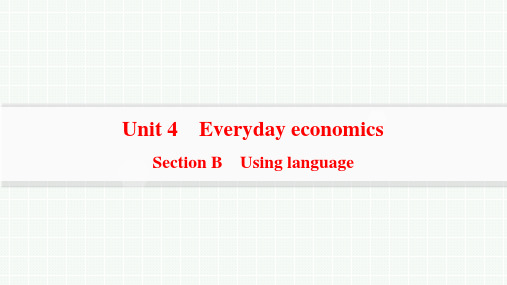
2.which与as引导非限制性定语从句的区别
项目 which
as
位置 只能放在先行词的后面 位置灵活,可位于句首、句中和句末
搭配 无动词的限制
谓语动词通常是表示感觉或心理活动的动 词,如see,hear,know,expect,remember等
意思 这一点,这件事
正如……,正像……的那样
Football,which is an interesting game,is played all over the world.
who
人
主语、宾语(限制性定语从句中可省略)、表
语
whom
人
宾语(限制性定语从句中可省略)
whose(=of
人或物 定语
whom/of which)
They are the lazy students whose homework wasn’t handed in.
他们是那些没有交作业的懒惰学生。
Actually,he is an honest and reliable person,whom you can rely on. 事实上,他是一个诚实可靠的人,你可以依靠他。
重点短语
1. go into debt
陷入债务之中,负债
2. meet one’s needs
满足某人的需求
3. on one’s own
独自
4. up to
高达,到
5.make ends meet 使收支相抵
6.interfere with
妨碍,阻止
要点探究•能力素养全提升
基础词汇——语境记忆
表示理由的名词,
如the reason
why
作原因状语
高中英语人教版必修四unit4精品复习ppt课件
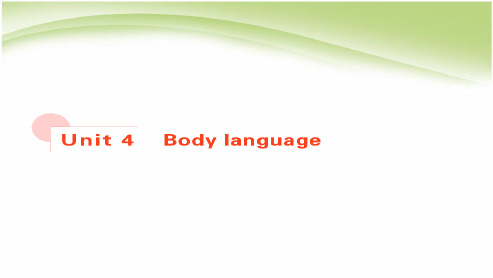
要点导航
(1)①部分否定句
如果句中使用了all,both,every或everyone,everybody,everything,
再使用否定词not,无论not出现在何处,该句都应视为部分否定句,译成
②全部否定句
“并不是……”。
表示全部否定时,
三者或三者以上用none;两者用neither。
②当表示前面的句子所说的情况也适合后面的句子时,如果前面是肯定 句,后面的句子常用so引起倒装句,即”。
generally speaking
Ⅱ.经典句型
1 . Not all cultures greet each other the same way , nor are they comfortable in the same way with touching or distance between people.各种文 化背景下人们互致问候的方式不尽相同,身体接触和相互间距离的程度也并 不一样。(回归课本P28)
语法核心突破
It doesn’t seem ugly to me; ___o_n_t_h_e_c_o_n_tr_a_ry_ (恰恰相反), I think it’s
very beautiful.
It’s rude to _______________________ __t_u_r_n_y_ou(r背b对ack着to你yo的ur老师) and refuse to
要点导航
with ease feel/look at ease put/set sb.at one’s ease
轻易地,毫不费力地
感到/看上去心情放松 使某人放松、松弛
6.in general大体上;一般地 Being respectful to people is subjective,based on each culture,but in_general it is probably not a good idea to give a hug to a boss or teaቤተ መጻሕፍቲ ባይዱher.(回 归课本P30)
人教版高中英语必修四 Book 4 Unit 4 Showing Our Feelings PPT课件

Task 1 complete the passage
Body language is used by people to _______ their thoughts and opinions and express to______________ communicate with each other. When you talk with others, you are not just using words, but also using facial expressions as well as ________. gestures Just like words, body language _______ varies from culture to culture.
to show no interest to the person
6. standing, holding your arms across your chest
to protect yourself from an unwanted conversation
similar body language
Unit 4 Showing Our Feelings
1. What is the main idea?
Body language has many universal gestures.
2.Does the smile always mean happiness?
A smile usually show happiness and put people at ease.
让步状语 从句, 此句是复合句。even if 引导_________ 其中主句 中it 作 形式主语 ________,真正的主语为 to “read”others around us 。 _____________________________ “__________________________________ 读懂”我们周围的人的意思是有可能的, 句意为: 即便是人们并不想让我们捕捉到他们没有说 _________________________________________ 出来的信息。 _______________________
高一英语必修四_unit4__reading课件

Unit 4 Body language •What do you think the purpose of language?•How can you communicate with someone if you cannot speak?•How many ways can you think of to greet someone if you cannot speak?Communication: No problem?•Step1. fast reading•1) What is the main idea of the text?2) How many parts can we divide the passageinto?3) What’s the main idea for each part?•1) What is the main idea of the text?–The passage introduces some examples of cultural body language when greetingpeople.•2) How many parts can we divide the •passage into?–Part 1 (para. 1)–Part 2 (para. 2 and 3 )–Part 3 (para. 4 and 5 )3) What’s the main idea for each part?Part 1 (para. 1)We are sent to Capital International Airport to meet some international students.Part 2 (para. 2 and 3)Examples of learned or cultural “bodylanguage”.Part 3 (para. 4 and 5)Different people have different physical ways to greet others. Learning about their customs can help avoid difficulties in communication.Step 2. Scan the text and find outCountry / Area Ways to greet each otherBritain Shake hands. Do not stand very close to others or touchstrangers when they meet.Canada Shake hands.Japan Bow.Spain, Italy, SouthAmerican countriesApproach others closely and are more likely to touch them. France Shake hands and kiss each other twice on each cheek.Middle East, some Muslim countries Shake hands and stand quite close to other men. Nod to women but do not shake hands with them.Name Description Body language To whom Tony Garcia man from Colombia Kiss on the cheek everyoneJulia Smith woman from Britain no touching everyoneAkira Nagata man from Japan bowing everyone George Cook man from Canada shaking hands everyoneAhmed Aziz man from Jordan shaking handsnodding to manto womanDarlene Coulon woman from France shake hands and kisstwice on each cheekpeople she knowsStep 3. use the passage to help you answer the following questions1) Is the author of this passage male or female? How doyou know?The author is male. Ahmed Aziz will not shake hands with women, but he shakes hands with the author.2) What were the two mistakes that the author noticed?He noticed that the Colombian man kissed theBritish woman, but in her culture, a kiss from astranger is not expected. He also noticed that theJapanese man bowed just as the Canadian manstarted to shake hands, so one man’s nosetouched the other man’s hand.•3)Who seemed to prefer to keep more physical diastance from others? Who seemed to prefer closer physical distance ?•The British woman, Julia and probably the Canadian man, George, seemed to prefer to keep more physicaldistance from others. The Colombian man, Tony, and the Jordanian man Ahmed, seemed to prefer closer physical distance.•4) Did any students have similar greeting customs? If so, which one?•Yes. Tony from Colombia and Darlene from France had a similar greeting custom —a kiss. George from Canada and Ahmed from Jordan also had a similar greeting custom —a handshake, but Ahmed shakes hands only with men.•5) “When in Rome, do as the Romans do.”What do you think this famous saying means?•This saying means that when we are in a certain place, we should follow the customs of the people who live in that place, not our own customs.•6) Do you agree with the author’s statement that body language is not good or bad? Why or why not?Step 4. summaryStep 5. translation1.The first person to arrive was TonyGarcia, closely followed by Julia Smith from Britain.2. Not all cultures greet each other thesame way, nor are they comfortable in the same way with touching or distance between people.3. However, people from places like Spain,Italy or South American countriesapproach others closely and are morelikely to touch them.Step 5. homework •Complete p.27 Exercise 3。
人教版高中英语必修四课件-Unit 4 Body Language P-1PPT课件

Person & country
Suitable greeting
a man from Canada To M: Shakes hands.
To F: Shakes hands or kisses on
Both cheeks if known.
a woman from France To M: Shakes hands or kisses
• 2. What parts of the world are not represented by the visitors?
Africa, Australia and Central America.
• 3. Why is Julia Smith surprised?
Julia Smith is surprised that Mr Garcia touches her shoulder and kisses on the cheek when they meet.
They shake hands & kiss each other twice on each cheek.
• 6. Is the main character male or female?
How do you know?
From the 5th paragraph we know that there are only two women, one is Julia Smith, the other is Madame Coulon, so the main character must be a man.
7 I’m very nervous. 8 I’m tired &sleepy.
Patting or rubbing stomach. Hanging head. Smiling, arms open and head back.
人教版高中英语选择性必修第四册UNIT4 Section Ⅲ 课件
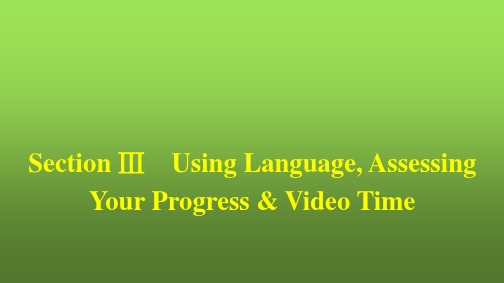
考点take for granted认为……是理所当然;对……不予重视 grant v.授予;同意;承认;认为 n.授予物;同意;给予
语境领悟
(1)Don't take his help for granted. 不要认为他的帮助是应该的。
(2)I take it for granted that they have arrived there already. 我还以为他们已经到那儿了。
(5)The evening ended with a reading from her latest novel. 晚会最后朗诵了一段她的最新小说。
学以致用 用late的适当形式填空 (1)I prefer the latter ,because I feel that it's much more convenient and cheaper. (2)Can you give me a reasonable excuse for your being so late ? (3)The latest developments have just been released to the media. (4)I haven't heard any news from my son lately .
3.Why do you think the speaker changed her attitude about her mother's voluntary work? A A.She has realised the influence her mother's work has on the people in need. B.Many dangerous diseases affected Tanzania. C.Her mother helped build a hospital in Tanzania. D.Her mother went to the rural villages to provide medical treatment.
人教版高中英语必修四Unit 4《Body language》ppt公开课课件
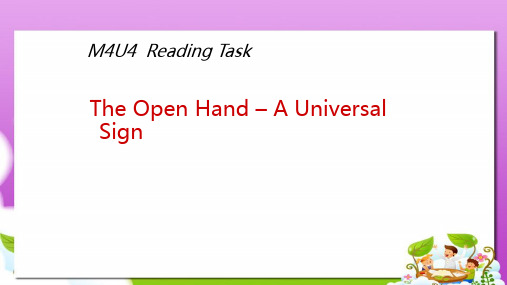
Think about it!
What can we do to avoid misunderstanding caused by ways of greeting between people from different cultures?
1. Be friendly and understanding.
编者语
• 要如何做到上课认真听讲?
•
我们都知道一个人的注意力集中时间是有限的,一节课45分钟如何保持时时刻刻都能认真听讲不走神呢?
•
1、往前坐
•
坐的位置越靠后,注意力就越难集中。老师不会注意到你的事实可以让你不再紧张,放心去做别的事情。坐在后面,视线分散,哪怕你是在看老师,如果有人移动,你的视线就会飘到那个同学的后脑勺上去,也就无法集中注意力。 而且,坐在后面很
•
2、不要看书,要看老师的眼睛
•
只要老师不是在一味地读教材,那老师的“话”就不可能和你低头看着的教材上的“文字”一致。头脑聪明的学生,也许能做到既集中精神听老师的话,又集中精神看眼前书上的内容。可是实际上大部分的学生都做不到这一点。
•
认真听讲的第一个阶段就是上课时间无条件地“往前看”,上课的时候看书往往很容易开小差。摒除杂念,将视线从摊在眼前的书上移开。老师讲课的时候只看前面,集中注意力听老师嘴里说出来的话,那才是认真听讲的态度。
2. Always wear a smile when greeting, for its something universal.
3. Combine spoken language and unspoken language to communicate better.
人教版英语必修四Unit 4 Body language课件(共30张PPT)
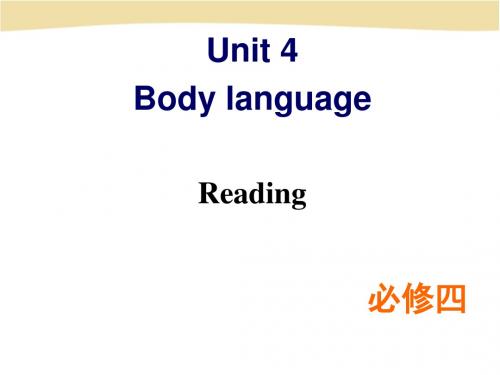
6. _d_a_s_h__ to run or travel somewhere in a great hurry
7. _a_p_p_r_o_a_c_h_ to come nearer to something or someone from a great distance
8. _a_ss_o_c_i_a_ti_o_ngroup of people organized for a special purpose
True or false?
1. Mr. Garcia kissed Miss Julia Smith because they have known each other well. F
2. George Cook reaches his hand out in order to shake hands with the Japanese. T
2. How did Julia behavior when Tony approached her? She appeared surprised and put up her hands to defence.
3. What does the phrase cultural mistake mean? People from different countries misunderstand each other.
people she
Coulon from France twice on
knows
each cheek
Read again and answer the questions.
1. How long did the writer wait at the airport? Half an hour.
高中英语课件-必修四Unit-4单词

representation n. 代表,描绘,展示
The competition attracted over 500 players
_____(represent) 8 different countries. representing
4. as if/though引导从句时,如果从句所 表示的情况不是事实,只是主观的想象 或夸大性的比喻。那么就用虚拟语气。
虚拟情况
从句时态
as if/though +从句
“表示虚拟”
与现在事 实相反
与过去事 实相反
与将来事 实相反
一般过去时/ (be动词一般用 were)
过去完成时 (had done)
exactly began.
6. approach: 靠近;接近;解决
1. The Dragon Boat Festival is approaching. 2. Someone is approaching our car. 3. The population in China approaches 1.4 billion at present. 4. What's the best way of approaching his problem.
send (one's) greetings to sb. 向某人问好
1. I wish to take this opportunity to send my best wishes and festival __g_r_e_et_i_n_g_s___(greet) to you and your family members.
- 1、下载文档前请自行甄别文档内容的完整性,平台不提供额外的编辑、内容补充、找答案等附加服务。
- 2、"仅部分预览"的文档,不可在线预览部分如存在完整性等问题,可反馈申请退款(可完整预览的文档不适用该条件!)。
- 3、如文档侵犯您的权益,请联系客服反馈,我们会尽快为您处理(人工客服工作时间:9:00-18:30)。
year’s international students.
Detailed reading : Para1
When: __y_e_s_t_e_r_d_a_y__ Who: __a_n__o_th__e_r_s_t_u_d_e_n__t _a_n_d__I,___
The first mistake
Tony Garcia (Columbia )
Part 1.
Examples of cultural “body
(para. 1) Part 2
(para. 2 &3 ) Part 3.
(para. 4 ) Part 4.
language”.
Different people have different body languages. Summary of body language. The author was sent to Capital
Let’s weclome all the teachers with warm applause!
Unit 4 Body language
Reading
Pre-reading
What do you think is the purpose of language?
To communicate with each other.
Good!
Bad!
Come here!
Me?
I don’t know!
ok
stop
silent
well done
What else gestures do you know?
victory
applause
Look at the following pictures. What are these people communicating? Discuss your ideas with your group members. Do you have the same idea about each picture?
Skim
Scan the text and answer the following
questions. (2&3)
How many international students are there in the story?
Six
Who are they and where they come from?
_th__is__y_e_a_r_’s__i_n_t_e_rn__a_ti_o_n_a__l _s_tu__d_e_n_t_s_ Where: _th__e_C__a_p_i_ta_l_I_n_t_e_r_n_a_t_io__n_a_l_A_i_r_p_o_r_t_ What to do: __W__e_w__o_u_l_d__ta_k__e_t_h_e_m___fi_r_s_t_t_o_
What are they communicating?
The mother is trying to quiet her crying child.
Someone is thinking deeply.
Someone is feeling ill/having a stomachache.
The policeman is directing traffic/ telling cars to go.
Reading
Communication: No problem?
Look at the title and picture on page 26 and predict what the passage is about.
Which is the main idea of the text? A. There are different customs in different countries. B. Foreigners should follow the customs of the country where they are visiting. C. People use body movements to send messages and different body movements have different meanings. D. The importance of knowing customs.
Who are they and where do they come from? (2&3)
Tony Garcia
Columbia
Julia Smith
Britain
Akira Nagata
Japan
George Cook Ahmed Aziz Darlene Coulon
t_h_e_i_r_d__o_r_m_i_t_o_r_ie_s__a_n_d__t_h_e_n__to__t_h_e_ s__tu_d__e_n_t_c_a_n__te_e__n_. _______________
Find out the two cultural mistakes in Para2 Read it aloud by yourself.
How can you communicate with someone if you cannot speak? Give an example.
What is Body Language?
One form of communication without speaking , such as gestures , facial expressions , and Postures .
Canada Jordan France
Do all members of all cultures behave the same way ?
No, they don’t.
Divide the whole passage into four parts and match the main idea.
